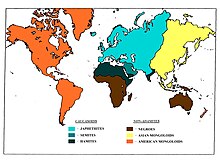Polygenism: Difference between revisions
No edit summary |
No edit summary |
||
| Line 19: | Line 19: | ||
Many [[oral tradition]]s feature polygenesis in their [[creation myth]]s. |
Many [[oral tradition]]s feature polygenesis in their [[creation myth]]s. |
||
Polygenism was heavily criticized in the 20th century [[Roman Catholic Church]], and especially by Pope [[Pius XII]] in the encyclical [[Humani Generis]], who felt that although creationism could be argued further, polygenism was not a valable alternative given the fact that it was associated with unorthodox anthropology and a number of racist ideas historically related to [[ |
Polygenism was heavily criticized in the 20th century [[Roman Catholic Church]], and especially by Pope [[Pius XII]] in the encyclical [[Humani Generis]], who felt that although creationism could be argued further, polygenism was not a valable alternative given the fact that it was associated with unorthodox anthropology and a number of racist ideas historically related to [[eugenics]] and national-socialism. |
||
==See also== |
==See also== |
||
Revision as of 09:39, 23 December 2008
This article needs additional citations for verification. (May 2008) |
Polygenism is a theory of human origins positing that the human races are of different lineages, either from a scientific or a religious basis. This is opposite to the idea of monogenism, which posits a single origin of humanity.
From the point of view of religion, polygenism is an uncommon Biblical interpretation. Until the mid-1800s it was largely considered heretical. It was first raised by Isaac La Peyrère, a French polymath seeking to reconcile the limited number of generations between Adam and Eve and modern day by positing pre-Adamites.
It was not believed that the number of races could have developed within the commonly accepted biblical timeframe. Voltaire even brought the subject up in his Essay on the Manner and Spirit of Nations and on the Principal Occurrences in History in 1756 (which was an early work of comparative history), although Voltaire made no attempt to solve the problem.

Polygenism came into mainstream scientific and religious thought due to the work of Samuel George Morton and more prominently Louis Agassiz in the United States. The issue of race was polemical, and slave owners attempted to justify their treatment of slaves using claimed empirical science such as Morton's work.
They argued that each race was a different species, and that black Africans were mentally inferior to Caucasians. Agassiz believed that each race was unique, but could still be classified as the same species. Contemporary geological discoveries described the earth as far older than strict interpretation of Genesis allows, and among some thinkers, polygenism was a way to reconcile the new discoveries with their faith.
In the race debates of the 1860s and 1870s, Charles Darwin and his supporters argued for a monogenism of the species — seeing the common origin of all humans as essential for evolutionary theory. This is called the single-origin hypothesis, although it is no longer acknowledged as crucial to evolution by the scientific community.
In the late 20th century, the work of the paleoanthropologist Carleton Coon was the closest to what can be perhaps considered a "modern" polygenism by positing that the individual races of the earth separately evolved into modern homo sapiens. This hypothesis, called the multiregional hypothesis, was not very popular when it was presented in the mid-1960s, though there continue to be some vocal advocates for it within the scientific community.
Many oral traditions feature polygenesis in their creation myths.
Polygenism was heavily criticized in the 20th century Roman Catholic Church, and especially by Pope Pius XII in the encyclical Humani Generis, who felt that although creationism could be argued further, polygenism was not a valable alternative given the fact that it was associated with unorthodox anthropology and a number of racist ideas historically related to eugenics and national-socialism.
See also
References
- George W. Stocking, Jr., Victorian Anthropology (New York: Free Press, 1987).
